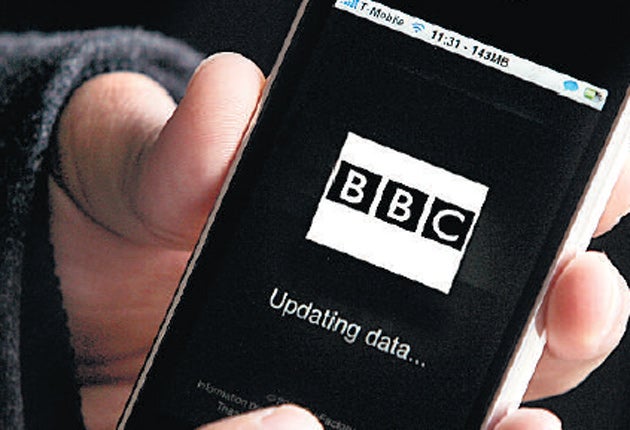Newspapers' fury at BBC's mobile push
Publishers attack moves to launch new applications for latest smartphones

Britain's national newspaper companies, which are already experiencing severe financial difficulties from the growth of the internet and the downturn in advertising during the recession, are furious that the BBC is preparing to compete with them by launching new applications for mobile phones.
The Newspaper Publishers Association (NPA) issued a statement yesterday saying the BBC's ambitions were a threat to what is seen as an important source of revenue for media organisations as people increasingly receive their news via Apple iPhones and other handheld devices. The Corporation hopes to launch a BBC News "app" in April, followed by a BBC Sport service the following month, in time for the build up to the football World Cup in South Africa.
The NPA, which believes the competition would reduce the likelihood of consumers paying for news and information services from commercial providers, said it would try to block the launch of the BBC products by appealing to the BBC Trust and the Department of Culture, Media and Sport.
Read More: Compare providers and find the best deals with our Mobile Phone Deals page
David Newell, the NPA's director, said: "Not for the first time, the BBC is preparing to muscle into a nascent market and trample over the aspirations of commercial news providers. At a time when the BBC is facing unprecedented levels of criticism over its expansion, and when the wider industry is investing in new models, it is extremely disappointing that the Corporation plans to launch services that would throw into serious doubt the commercial sector's ability to make a return on its investment, and therefore its ability to support quality journalism."
Tensions have been steadily growing between the press and the BBC because the scale of the Corporation's journalistic output on its website has been identified by many media companies as an inhibitor to opportunities to persuade internet users to pay for news. The criticisms have increased as Rupert Murdoch's News Corp media empire has signalled its intention to charge for access to all its newspaper websites later this year. Other specialist publications have also abandoned free provision of content, in order to charge consumers for online subscriptions.
Some newspapers had identified mobile phone applications as a new way of generating revenue. The Independent's app is available for free but the Guardian, in spite of a commitment to maintain free access to its website, is charging £2.39 for its app.
Mr Newell said: "The impact of the BBC's existing online presence is well known. However, this is a very different and particular case. The market for iPhone news apps is a unique and narrow commercial space, which means that the potential for market distortion by the BBC is much greater. This is not, as the BBC argues, an extension of its existing online service, but an intrusion into a tightly defined, separate market."
The BBC Trust, the Corporation's governing body, has previously intervened to curtail its ambitions. It blocked the Corporation from supplying video footage to its local news sites after regional newspaper groups complained.
The BBC is under pressure from politicians as well as commercial rivals over the scale and cost of its operations, and its director general Mark Thompson is conducting a strategic review of which services are needed. In a speech in November, he said there would be "reductions in some kinds of programmes and content" including a look at the "current scope of our website".
But the BBC's director of future media and technology, Erik Huggers, is likely to argue that the Corporation will merely be making available to licence fee payers the content they have already funded. When he announced the new mobile services earlier this week at the Mobile World Congress in Barcelona, Mr Huggers said: "It's been 12 years since the launch of BBC Online, but as media converges and technology accelerates, licence fee payers are increasingly using handheld devices. They tell us they want to access the digital services they've paid for at a time and place that suits them."
Join our commenting forum
Join thought-provoking conversations, follow other Independent readers and see their replies
Comments
Bookmark popover
Removed from bookmarks